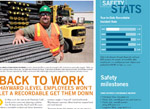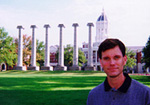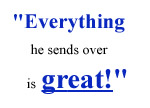
Suppliers
Embody Excellence
Teijin Seiki, E-Systems
go the extra mile
By Mark Ziegler
Materiel
Boeing Commercial Airplanes Group
Some suppliers take the position that a failed part manufactured to Boeing specifications is Boeing's problem.
Not Teijin Seiki.
In 1987, the Japanese firm showed just how much "ownership" it takes in the parts it makes, even if those parts are built to someone else's specifications.
During descent, pilots flying 767s reported intermittent message lights indicating the outboard aileron lockout actuator wasn't working. When the planes landed, maintenance personnel couldn't detect any problems in the system. Testing eventually showed the actuator's limit switches were freezing at minus 40 degrees Fahrenheit, causing the warnings.
According to Doug Wells, a Materiel buyer in Systems and Equipment, Teijin Seiki quickly located another subcontractor who could supply a better switch, incorporated the new switch into the actuator design, and verified the integrity of the part.
"Some suppliers might have taken a lot of time getting the problem fixed or might have shirked any responsibility at all," said Wells. "They (Teijin Seiki) seem to have the attitude that, 'It's our hardware, we'll take care of it -- we'll fix it.'"
That attitude is reflected in the quality of the parts Teijin Seiki supplies, Wells said. Less than one-half of 1 percent of the Japanese manufacturer's parts was rejected in the past year, and deliveries were consistently on time.
Teijin Seiki first produced parts for Boeing in 1976, when it made main gear actuators for the 737. Since then, Boeing has increased its business and currently purchases a variety of hydraulic actuators and valves for the spoilers, ailerons and the landing gears.
Wells lauded the longtime devotion of Teijin Seiki's management to quality improvement, which he said enables the firm to "always come up with cost-saving ideas, savings they're willing to share with Boeing."
Because many of the company's parts and processes are produced and performed internally, Teijin Seiki relies less on subcontractors, retaining more control over the eventual product, Wells says.
Paul DiBianco, procurement manager for Systems and Equipment, cited Teijin Seiki's responsiveness to engineering ideas and requests from Boeing and said the firm often finds innovative ways to improve on the equipment it makes.
Like all good suppliers, Teijin Seiki possesses one important intangible -- the desire to constantly do better.
"If it's necessary for them to build a new plant overseas to reduce costs and offer better service, they build a new plant," Jim Rumpakis, senior manager in Systems and Equipment said, noting Teijin Seiki's recent opening of a Redmond operation.
Related sidebar article:
E-Systems' team approach works





